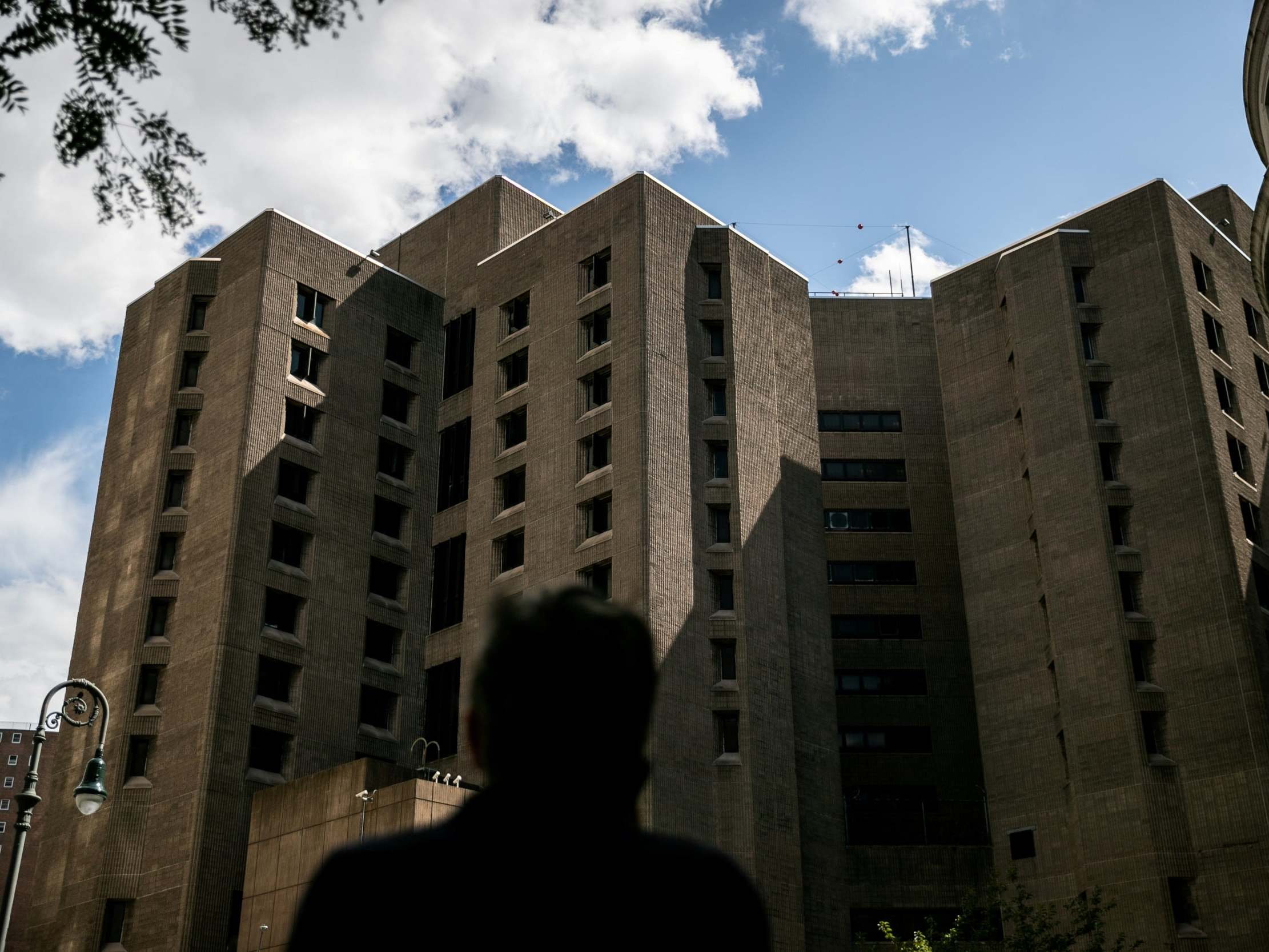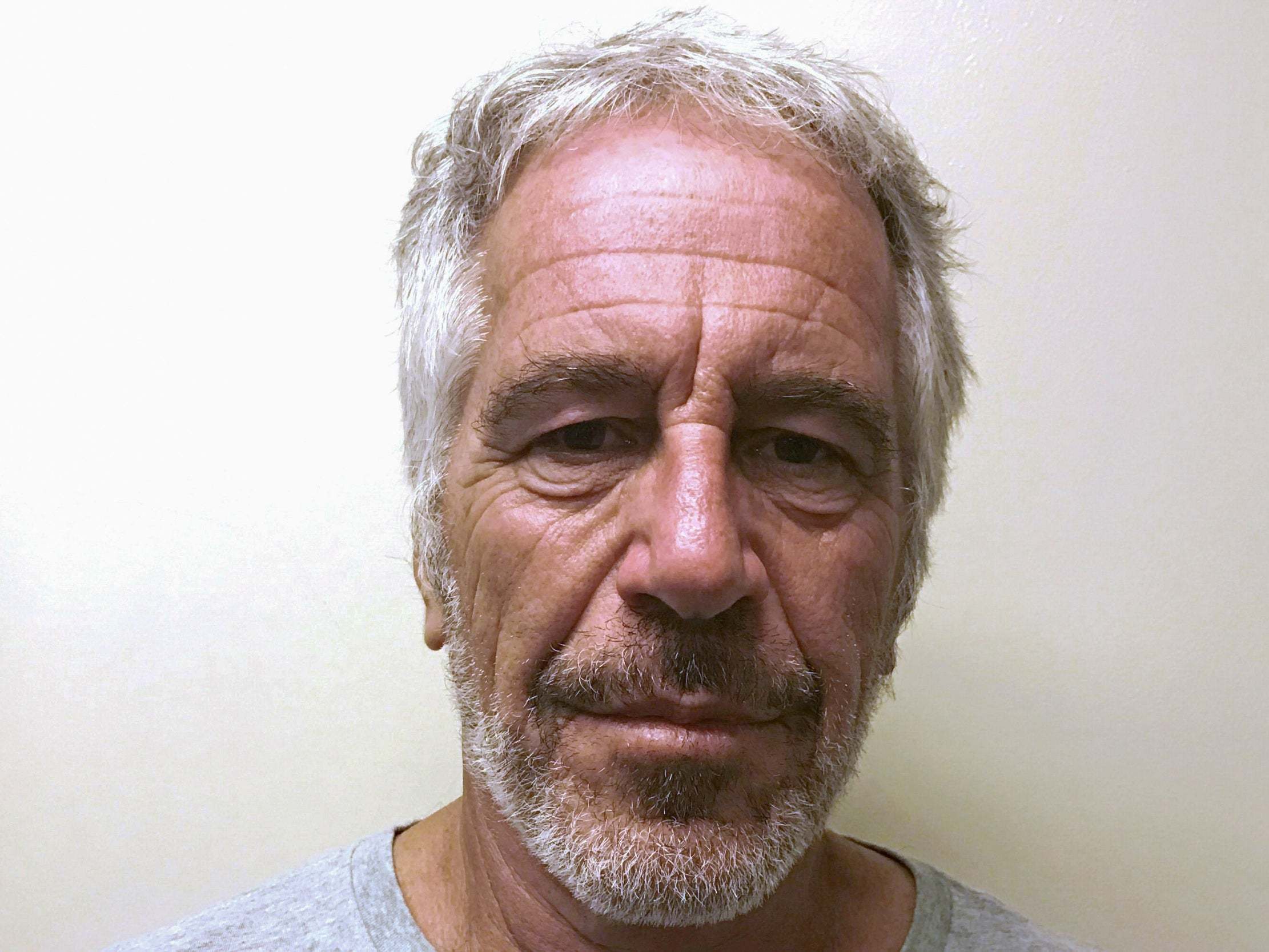Epstein death: Prison officer 'removed from suicide watch night before billionaire paedophile died'
Investigations continue into why billionaire paedophile was not checked on for 'several hours' before death
Corrections officers had not checked in on financier and registered sex offender Jeffrey Epstein for "several" hours before he was found hanging in his cell Saturday, a person familiar with the matter said, just one in a series of missteps in the hours leading up to his death.
Officers should have been checking on Epstein, who was being held in a special housing unit of the Metropolitan Correctional Center in New York City, every 30 minutes, and, under normal circumstances, he also should have had a cellmate, according to the person familiar with the matter and union officials representing facility employees.
But a person who had been assigned to share a cell with Epstein was transferred on Friday, and - for reasons that investigators are still exploring - he did not receive a new one, the person familiar with the matter said Sunday night.
That left Epstein, who had previously been placed on suicide watch, alone and unmonitored - at least in the hours before his death - by even those officers assigned to guard him.
The person familiar with the matter spoke on the condition of anonymity to discuss the investigation.
The revelations are sure to increase scrutiny of the Federal Bureau of Prisons and the Metropolitan Correctional Center, a high-rise facility in Manhattan where Epstein, 66, was found unresponsive in his cell Saturday while he was awaiting trial.
He was facing federal charges alleging that he sexually abused dozens of girls in the early 2000s. After being found, he was taken to a hospital, where he was pronounced dead.
The hanging, which authorities had classified initially as an "apparent suicide," triggered investigations of how such a high-profile inmate, who was supposed to have been carefully monitored, could have died in federal custody.
It also caused outrage among his victims and their representatives, who had hoped that Epstein's trial next year would produce the justice they thought he had long evaded.
The Federal Bureau of Prisons did not return repeated messages seeking a comment.
Barbara Sampson, New York City's chief medical examiner, said her office conducted an autopsy of Epstein's body Sunday but had not yet reached a determination on cause of death, "pending further information."
The medical examiner also allowed Michael Baden, a private pathologist, to observe the autopsy at the request of Epstein's representatives, Ms Sampson said.
The two corrections officers assigned to watch the special unit in the detention centre where Epstein was being housed were working overtime - one forced to do so by management, the other for his fourth or fifth consecutive day, the president of the local union for staffers said.

Serene Gregg, president of the American Federation of Government Employees Local 3148, said the Metropolitan Correctional Center in Manhattan is functioning with less than 70 percent of the needed correctional officers, forcing many to work mandatory overtime and 60- or 70-hour workweeks.
She said one of the individuals assigned to watch Epstein's unit did not normally work as a correctional officer but, like others in roles such as counsellors and teachers, was able to do so. She declined to say which one or specify the person's regular role.
"If it wasn't Mr. Epstein, it would have been somebody else, because of the conditions at that institution," Ms Gregg said. "It wasn't a matter of how it happened or it happening, but it was only a matter of time for it to happen. It was inevitable. Our staff is severely overworked."
Ms Gregg said she did not know details of the investigation into Epstein's death and declined to detail her discussions with those working that night.
But she said she has long complained about understaffing at the facility, telling superiors, "It's only a matter of time before we have a loss of life." And in Epstein's case, she said, it was possible overwork of officers played a role.
"It's daunting, mentally, physically. I would feel confident in saying that some of that contributed to the unfortunate death of inmate Epstein," she said, clarifying later that she did not know with certainty whether workload played a role in the incident because she was not privy to details of the investigation.
On Sunday, amid inquiries by the FBI, Justice Department's inspector general and New York City medical examiner, questions remained.
"It's our practice not to comment on ongoing investigations," said John Lavinsky, a spokesman for the Justice Department's inspector general.

Epstein was not on suicide watch Saturday before he was found, but because he was held in the facility's special housing unit, he should have been checked on every 30 minutes, according to union officials and a person familiar with the investigation.
A person familiar with the matter said that procedure was not being followed, at least according to preliminary information corrections officials gave investigators. Ms Gregg declined to comment on internal security procedures.
It was also not clear how much, if any, of the incident or authorities' check-ins was captured on camera. E.O. Young, the national president of the Council of Prison Locals C-33, said that while cameras are prevalent in the facility, he did not believe they generally captured inmates' cells.
The Federal Bureau of Prisons said Saturday that lifesaving measures were "initiated immediately" after Epstein was found, and then emergency responders were summoned.
Epstein had been placed on suicide watch after a July 23 incident in which he was found in his cell with marks on his neck - which subjected him to near constant monitoring and daily psychological evaluations, according to people familiar with the case.
But he was taken off that about a week later and brought to the special housing unit, where there was a higher level of security, but not constant monitoring.
Before the incident, Epstein had a cellmate: Nicholas Tartaglione, a former police officer in custody on murder and narcotics charges. But Mr Young, the national union president, said Epstein was in a cell alone immediately before his death.
Mr Young said he was not certain why Epstein was in the cell alone, as the Bureau of Prisons has moved recently to make sure fewer inmates are housed on their own.
He said there was some speculation after the July 23 incident that Epstein was trying to get away from Tartaglione, whom he feared, and he believed that - at least for a time - Epstein had another cellmate after coming off suicide watch.
Mr Young asserted that in the facility's general population, Epstein also probably would have been a target, and that there was only so much officers could do to prevent him from harming himself.

But Mr Young said, even in Epstein's case, correctional officers face a grim reality.
"We can't ever stop anyone who is persistent on killing themselves," Young said. "The only thing the bureau can do is delay that."
Young said he and other officials had long been raising concerns as the Trump administration had imposed a hiring freeze and budget cuts on the Bureau of Prisons.
"All this was caused by the administration," Mr Young said.
Spokesmen for the White House did not immediately respond to a request for comment. In congressional testimony earlier this year, Attorney General William Barr conceded that the bureau was "short" about 4,000 or 5,000 employees and said he had lifted the hiring freeze and was trying to ensure a steady pipeline of new officers to replace those who leave.
"I think this is an area where we have stumbled," Mr Barr said.
Though Epstein's death will short-circuit his trial, the U.S. Attorney in Manhattan said Saturday that authorities were continuing to explore those who might have conspired with Epstein.
The financier had a star-studded list of acquaintances and friends - including former president Bill Clinton and President Donald Trump - although investigators' focus in the past has been on the less-famous people who worked with Epstein and have been accused of helping procure girls for him.
Epstein had pleaded guilty in 2008 to two state charges of soliciting prostitution to resolve similar sexual abuse allegations as part of an agreement that has been widely criticised as overly lenient.
The deal allowed Epstein to spend just 13 months in jail and be released regularly for work, and it spared those who worked with him from prosecution.
It was approved by Alex Acosta, who was then the US Attorney in Miami. Mr Acosta would go on to serve as labour secretary in the Trump administration but resigned from his post last month after federal prosecutors in New York charged Epstein, renewing questions about the earlier deal.
The Washington Post
Join our commenting forum
Join thought-provoking conversations, follow other Independent readers and see their replies
Comments
Bookmark popover
Removed from bookmarks